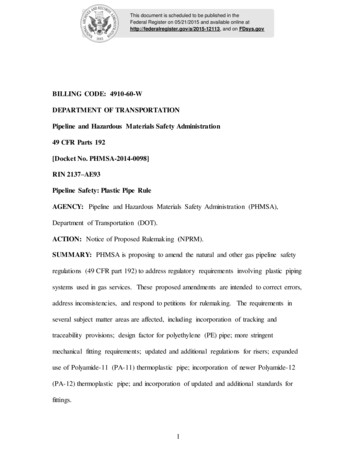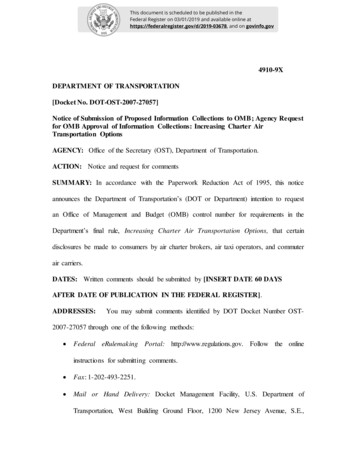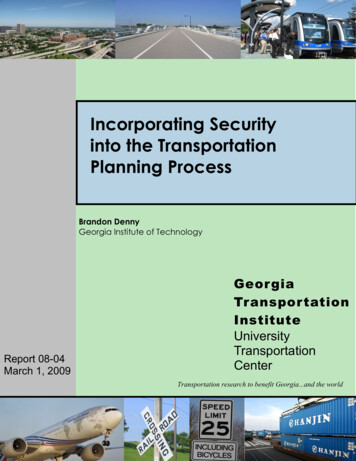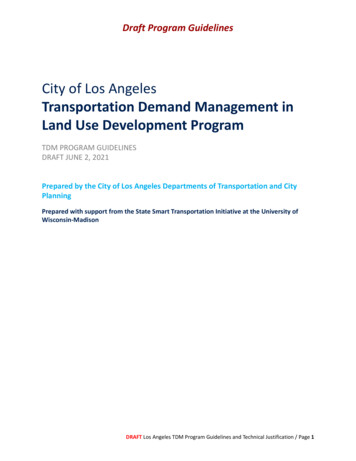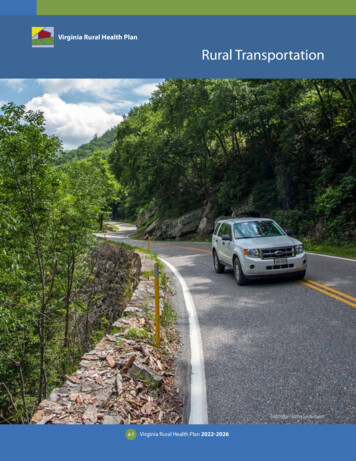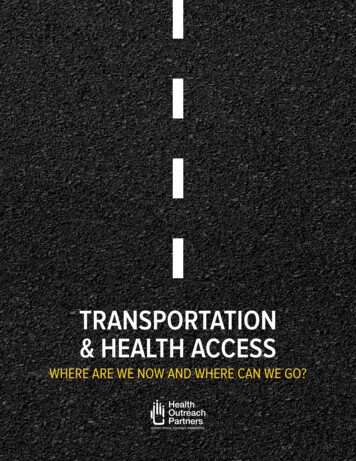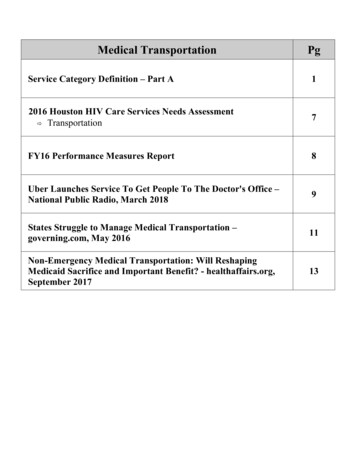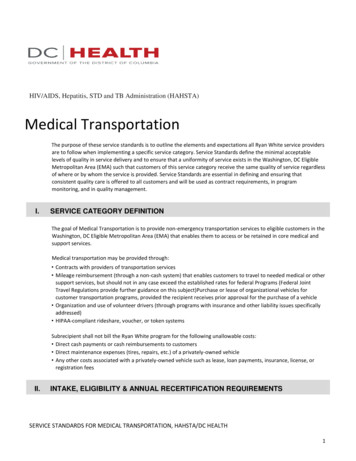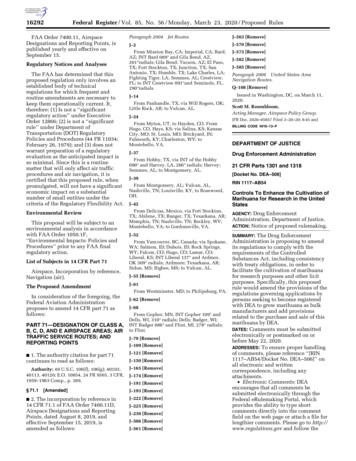![DEPARTMENT OF TRANSPORTATION [4910-EX-P] Federal Motor Carrier Safety .](/img/57/unified-carrier-registration-plan-fees.jpg)
Transcription
DEPARTMENT OF TRANSPORTATION[4910-EX-P]Federal Motor Carrier Safety Administration49 CFR Part 367[Docket No. FMCSA-2018-0068]RIN 2126-AC12Fees for the Unified Carrier Registration Plan and AgreementAGENCY: Federal Motor Carrier Safety Administration (FMCSA), DOT.ACTION: Final rule.SUMMARY: This rule establishes reductions in the annual registration feescollected from motor carriers, motor private carriers of property, brokers, freightforwarders, and leasing companies for the Unified Carrier Registration (UCR)Plan and Agreement for the registration years 2019, 2020 and thereafter. For the2019 registration year, the fees will be reduced below the 2017 registration feelevel that was in effect by 18.62 percent to ensure that fee revenues collected donot exceed the statutory maximum, and to account for the excess funds held in thedepository. The fees beginning with the 2020 registration year will be reducedbelow the 2017 level by approximately 9.9 percent. The reduction of the current2019 registration year fees (finalized on January 5, 2018) range fromapproximately 11 to 10,282 per entity, depending on the number of vehiclesowned or operated by the affected entities. The reduction in fees for 2020 andsubsequent registration years range from approximately 5 to 3,899 per entity.DATES: This final rule is effective [Insert date of publication in the FEDERALREGISTER].1
FOR FURTHER INFORMATION CONTACT: Mr. Gerald Folsom, Office ofRegistration and Safety Information, Federal Motor Carrier SafetyAdministration, 1200 New Jersey Avenue, SE, Washington, DC 20590-0001 orby telephone at 202-385-2405.SUPPLEMENTARY INFORMATION:I.Rulemaking DocumentsA.Availability of Rulemaking DocumentsFor access to docket FMCSA-2018-0068 to read background documents,go to https://www.regulations.gov at any time, or to Docket Services at U.S.Department of Transportation, Room W12-140, 1200 New Jersey Avenue, SE,Washington, DC 20590, between 9 a.m. and 5 p.m., Monday through Friday,except Federal holidays.B.Privacy ActIn accordance with 5 U.S.C. 553(c), the U.S. Department ofTransportation (DOT) solicits comments from the public to better inform itsrulemaking process. DOT posts any comments, without edit, including anypersonal information the commenter provides, to www.regulations.gov, asdescribed in the system of records notice (DOT/ALL 14 - FDMS), which can bereviewed at tions and AcronymsThe following is a list of abbreviations used in this documentCECategorical ExclusionDOTU.S. Department of Transportation2
E.O.Executive OrderFMCSAFederal Motor Carrier Safety AdministrationNPRMNotice of Proposed RulemakingOMBOffice of Management and BudgetPRAPaperwork Reduction ActRFARegulatory Flexibility ActSBREFASmall Business Regulatory Enforcement Fairness ActSBTCSmall Business in Transportation CoalitionSSRSSingle State Registration SystemUCRUnified Carrier RegistrationUCR AgreementUnified Carrier Registration AgreementUCR BoardUnified Carrier Registration Board of DirectorsUCR PlanUnified Carrier Registration PlanIII.Executive SummaryA.Purpose and Summary of the Major ProvisionsThe UCR Plan and the 41 States participating in the UCR Agreementestablish and collect fees from motor carriers, motor private carriers of property,brokers, freight forwarders, and leasing companies. The UCR Plan andAgreement are administered by a 15-member board of directors (UCR Board); 14appointed from the participating States and the industry, plus the DeputyAdministrator of FMCSA. Revenues collected are allocated to the participatingStates and the UCR Plan. A maximum amount that the UCR Plan may collect isestablished by statute. If annual revenue collections will exceed the statutory3
maximum allowed, then the UCR Plan must request adjustments to the fees. 49U.S.C. 14504a(f)(1)(E). In addition, any excess funds held by the UCR Plan afterpayments are made to the States and for administrative costs are retained in theUCR depository, and subsequent fees charged must be adjusted further in order toreturn the excess revenues held in the depository as required by 49 U.S.C.14504a(h)(4). Adjustments in the fees are requested by the UCR Plan andapproved by FMCSA. These two provisions are the reasons for the two-stageadjustment adopted in this final rule. The final rule provides for a reduction for atleast the next two registration years to the annual registration fees established forthe UCR Agreement.For the 2019 registration year, the fees will be reduced below the 2017registration fee level that was in effect by 18.62 percent to ensure that feerevenues do not exceed the statutory maximum, and to account for the excessfunds held in the depository. The fees beginning with the 2020 registration yearwill be reduced below the 2017 level by approximately 9.9 percent. The reductionof the current 2019 registration year fees (finalized on January 5, 2018) rangesfrom approximately 11 to 10,282 per entity, depending on the number ofvehicles owned or operated by the affected entities. The reduction in fees for 2020and subsequent registration years ranges from approximately 5 to 3,899 perentity.B.Benefits and CostsThe changes imposed by this final rule reduce the fees paid by motorcarriers, motor private carriers of property, brokers, freight forwarders, and4
leasing companies to the participating States. While each motor carrier willrealize a reduced burden, fees are considered by the Office of Management andBudget (OMB) Circular A-4, Regulatory Analysis, as transfer payments, notcosts. Transfer payments are payments from one group to another that do notaffect total resources available to society. Therefore, transfers are not consideredin the monetization of societal costs and benefits of rulemakings.IV.Legal Basis for the RulemakingThis rule adjusts the annual registration fees for the UCR Agreementestablished by 49 U.S.C. 14504a. The requested fee adjustments are required by49 U.S.C. 14504a because, for the registration year 2017, the total revenuescollected were expected to exceed the total revenue entitlements of 107.78million distributed to the 41 participating States plus the 5 million established forthe administrative costs associated with the UCR Plan and Agreement. 1 Therequested adjustments have been submitted by the UCR Plan in accordance with49 U.S.C. 14504a(f)(1)(E)(ii), which requires the UCR Board to request anadjustment by the Secretary of Transportation (Secretary) when the annualrevenues collected exceed the maximum allowed. In addition, 49 U.S.C.14504a(h)(4) states that any excess funds held by the UCR Plan in its depository,after payments to the States and for administrative costs, shall be retained “andthe fees charged shall be reduced by the Secretary accordingly.”1The UCR Plan is “the organization responsible for developing, implementing, and administering theunified carrier registration agreement.” 49 U.S.C. 14504a(a)(9). The UCR Agreement developed by theUCR Plan is the “interstate agreement governing the collection and distribution of registration andfinancial responsibility information provided and fees paid by motor carriers, motor private carriers,brokers, freight forwarders, and leasing companies .” 49 U.S.C. 14504a(a)(8).5
The UCR Plan also requested approval of a revised total revenue target tobe collected because of a reduction in the amount for costs of administering theUCR Agreement. No changes in the revenue entitlements to the participatingStates were recommended by the UCR Plan. The revised total revenue target mustbe approved in accordance with 49 U.S.C. 14504a(d)(7) and (g)(4).The Secretary also has broad rulemaking authority in 49 U.S.C. 13301(a)to carry out 49 U.S.C. 14504a, which is part of 49 U.S.C. subtitle IV, part B.Authority to administer these statutory provisions has been delegated to theFMCSA Administrator by 49 CFR 1.87(a)(2) and (7) 2.The Administrative Procedure Act allows agencies to make rules effectiveimmediately with good cause, instead of requiring publication 30 days prior to theeffective date. 5 U.S.C. 553(d)(3). FMCSA finds there is good cause for this ruleto be effective upon publication so that the UCR Plan and the participating Statesmay begin collection of fees immediately for the registration year that will beginon January 1, 2019. The immediate commencement of fee collection will avoidfurther delay in distributing revenues to the participating States.V.Statutory Requirements for the UCR FeesA.Legislative HistoryThe legislative history of 49 U.S.C. 14504a indicates that the purpose ofthe UCR Plan and Agreement is both to replace the Single State RegistrationSystem (SSRS) for registration of interstate motor carrier entities with the States2For the purpose of this rulemaking, the term “FMCSA” will frequently be used in place of “Secretary”due to the delegated authority provided by the Secretary. The term “Secretary” will be used in quotedmaterial and as otherwise appropriate.6
and to “ensure that States don’t lose current revenues derived from SSRS.” Sen.Rep. 109-120, at 2 (2005). The statute provides for a 15-member board ofdirectors for the UCR Plan to be appointed by the Secretary. The statute specifiesthat the UCR Board should consist of one director (either the FMCSA DeputyAdministrator or another Presidential appointee) from DOT; four directors fromamong the chief administrative officers of the State agencies responsible foradministering the UCR Agreement (one from each of the four FMCSA serviceareas); five directors from among the professional staffs of State agenciesresponsible for administering the UCR Agreement, to be nominated by theNational Conference of State Transportation Specialists; and five directors fromthe motor carrier industry, of whom at least one must be from a national tradeassociation representing the general motor carrier of property industry and onefrom a motor carrier that falls within the smallest fleet fee bracket. 49 U.S.C.14504a(d)(1)(B).The UCR Plan and the participating States are authorized by 49 U.S.C.14504a(f) to establish and collect fees from motor carriers, motor private carriersof property, brokers, freight forwarders, and leasing companies. The annual feescharged for registration year 2018 are set out in 49 CFR 367.40.For carriers and freight forwarders, the fees vary according to the size ofthe vehicle fleets, as required by 49 U.S.C. 14504a(f). The fees collected areallocated to the States and the UCR Plan in accordance with 49 U.S.C. 14504a(h).Participating States submit a plan demonstrating that an amount equivalent to the7
revenues received are used for motor carrier safety programs, enforcement, or theadministration of the UCR Plan and Agreement. 49 U.S.C. 14504a(e)(1)(B).The UCR Plan and the participating States collect registration fees foreach registration year, which is the same period as the calendar year. Generally,collection begins on October 1 of the previous year, and continues until December31 of the year following the registration year. All of the revenues collected aredistributed to the participating States or to the UCR Plan for administration of theUCR Agreement. No funds are distributed to the Federal government.B.Fee RequirementsThe statute specifies that fees are to be based on the recommendation ofthe UCR Board. 49 U.S.C. 14504a(d)(7)(A). In recommending the level of fees tobe assessed in any registration year, and in setting the fee level, the statute statesthat both the UCR Board and FMCSA “shall consider” the following factors: Administrative costs associated with the UCR Plan and Agreement; Whether the revenues generated in the previous year and any surplus orshortage from that or prior years enable the participating States to achieve therevenue levels set by the UCR Board; and Provisions governing fees in 49 U.S.C. 14504a(f)(1).FMCSA, if asked by the UCR Board, may also adjust the fees within areasonable range on an annual basis if the revenues collected from the fees areeither insufficient to provide the participating States with the revenues they areentitled to receive or exceed those revenues. 49 U.S.C. 14504a(f)(1)(E).8
Overall, the fees assessed under the UCR Agreement must produce thelevel of revenue established by statute. Section 14504a(g) establishes the revenueentitlements for States that choose to participate in the UCR Plan. That sectionprovides that a State, participating in SSRS in the registration year prior to theenactment of the Unified Carrier Registration Act of 2005, is entitled to receiverevenues under the UCR Agreement equivalent to the revenues it received in theyear before that enactment. Participating States that also collected intrastateregistration fees from interstate motor carrier entities (whether or not theyparticipated in SSRS) are also entitled to receive revenues of this type under theUCR Agreement, in an amount equivalent to the amount received in the yearbefore the Act’s enactment. Section 14504a(g) also requires that States that didnot participate in SSRS previously, but that choose to participate in the UCR Plan,may receive revenues not to exceed 500,000 per year. The UCR Board calculatesthe amount of revenue to which each participating State is entitled under the UCRAgreement, which is then approved by FMCSA.FMCSA’s interpretation of its responsibilities under 49 U.S.C. 14504a insetting fees for the UCR Plan and Agreement are guided by the primacy thestatute places on the need both to set and to adjust the fees so they “provide therevenues to which the States are entitled.” 49 U.S.C. 14504a(f)(1)(E)(i). Thestatute links the requirement that the fees be adjusted “within a reasonable range”by both the UCR Plan and FMCSA to the provision of sufficient revenues to meetthe entitlements of the participating States. 49 U.S.C. 14504a(f)(1)(E); see also 49U.S.C. 14504a(d)(7)(A)(ii).9
Section 14504a(h)(4) provides additional support for this interpretation.The provision explicitly requires FMCSA to reduce the fees for all motor carrierentities in the year following any year in which the depository retains any funds inexcess of the amount necessary to satisfy the revenue entitlements of theparticipating States and the UCR Plan’s administrative costs.VI.Recommendation from the UCR PlanOn December 14, 2017, the UCR Board voted unanimously to submit arecommendation to the FMCSA to reduce the fees collected by the UCR Plan forregistration years 2019 and thereafter. The recommendation was submitted to theFMCSA on January 11, 2018. 3 The requested fee adjustments are required by 49U.S.C. 14504a because, for registration year 2017, the total revenues collectedwere expected to exceed the total revenue entitlements of 107.78 milliondistributed to the 41 participating States plus the 5 million established for “theadministrative costs associated with the unified carrier registration plan andagreement.” 49 U.S.C. 14504a(d)(7)(A)(i). The maximum revenue entitlementsfor each of the 41 participating States, established in accordance with 49 U.S.C.14504a(g), were set out in a table attached to the January 11, 2018,recommendation.As indicated in the analysis attached to the January 11, 2018,recommendation letter, as of the end of November 2017, the UCR Plan hadalready collected 7.30 million more than the statutory maximum of 112.78million for registration year 2017. The UCR Plan estimated that by the end of3The January 11, 2018, recommendation from the UCR Plan and all related tables are available in thedocket for this rulemaking. (See I.A. above.)10
2018, total revenues would exceed the statutory maximum by 9.17 million, orapproximately 8.13 percent. The excess revenues collected would be held in adepository maintained by the UCR Plan as required by 49 U.S.C. 14504a(h)(4).The UCR Plan’s recommendation estimated the minimum projection ofrevenue collections for December 2017 through December 2018 by summing thecollections within each of the registration years 2013 through 2015 4 and thencomparing across years to find the minimum total amount. This is the samemethodology used to project collections and estimate fees in the previous feeadjustment rulemaking. 83 FR 605 (January 5, 2018).Under 49 U.S.C. 14504a(d)(7), the costs incurred by the UCR Plan toadminister the UCR Agreement are eligible for inclusion in the total revenuetarget, in addition to the revenue entitlements for the participating States. Thetotal revenue target for registration years 2010 to 2018, as approved in the 2010final rule (75 FR 21993 (April 27, 2010)), has been 112,777,059.81, including 5,000,000 for administrative costs. The UCR Plan’s latest recommendationincluded a reduction in the amount of the administrative costs to 3,500,000 forthe 2019 and 2020 registration years. The reduction of 1,500,000 recommendedby the UCR Plan was based on estimates of future administrative costs needed tooperate the UCR Plan and Agreement. No changes in the State revenueentitlements were recommended, and the entitlement figures for 2019 and 2020for the 41 participating States are the same as those previously approved for the4Collections for registration year 2016 are not available for use for this purpose because registration andfee collection for that year was not finalized at the time of the UCR Plan recommendation.11
years 2010 through 2018. Therefore, for registration years 2019 and 2020, theUCR Plan recommended a total revenue target of 111,277,060.A notice of proposed rulemaking (NPRM) reflecting the recommendationfrom the UCR Board was published by FMCSA. 83 FR 42244 (August 21, 2018).Comments addressing both the proposed adjustment in the fees and the separatenew total revenue target recommendation were due on August 31, 2018. VII.Discussion of the CommentsFMCSA received six comments on the NPRM. The commenters were:(1) Avelino Gutierrez, UCR Board Chairman, and G. Scott Morris, BoardMember; (2) National Motor Freight Traffic Association, Inc.; (3) Small Businessin Transportation Coalition (SBTC); (4) National School TransportationAssociation; (5) Kevin Johnson; and (6) “Anonymous.”Avelino Gutierrez and G. Scott MorrisThe comment was submitted by the two UCR Board members in theirindividual capacities and provided updated information on the actual andestimated revenue collections for the 2017 registration year.Based on the updated information provided about actual and estimatedcollections, and as required by the statutory provisions involved, the feesestablished in this final rule have been adjusted and are slightly lower than thefees proposed in the NPRM but are still expected to enable the total revenue targetto be met.National Motor Freight Traffic Association, Inc. and Kevin Johnson12
The National Motor Freight Traffic Association and Kevin Johnson bothsupport the proposed fee adjustment.Small Business in Transportation CoalitionThe comment from the Small Business in Transportation Coalition(SBTC) raises several issues, not all of which are relevant to the proposed feeadjustment. 5 SBTC first asserts that the current provisions of 49 CFR 367.50setting the fees for 2019 and subsequent years, as adopted in the final rule in Feesfor Unified Carrier Registration Plan and Agreement (83 FR 605 (January 5,2018)), are “unlawful and unenforceable.” SBTC bases that contention on thenotion that the final rule was not adopted within 90 days after the submission ofthe fee recommendation from the UCR Plan for the adjustment made in theJanuary 5 final rule. 49 U.S.C. 14504a(d)(7).FMCSA notes that SBTC made the same contention regarding the effectof this statutory provision in its comments in the previous rulemaking. FMCSArejected that contention in the January 5, 2018 final rule (see 83 FR 608) becauseit is now a well-established principle of administrative law that a statutorydeadline for agency action cannot, in the ordinary course, bar action after thedeadline unless that consequence is stated explicitly in the statute. In the leadingcase, Justice Marshall, in an opinion expressing the views of a unanimousSupreme Court, stated:We would be most reluctant to conclude that every failureof an agency to observe a procedural requirement voidssubsequent agency action, especially when important5The SBTC comment incorporates the text of a letter dated August 8, 2018, addressed to the Secretary.The disposition of SBTC’s comments in this final rule also disposes of the contentions in the August 8letter.13
public rights are at stake. When, as here, there are lessdrastic remedies available for failure to meet a statutorydeadline, courts should not assume that Congress intendedthe agency to lose its power to act.Brock v. Pierce County, 476 U.S. 253, 260 (1976) (footnotes omitted). In U.S. v.James Daniel Good Real Prop, 510 U.S. 43, 63 (1993), the Court stated that “if astatute does not specify a consequence for noncompliance with statutory timingprovisions, the Federal courts will not in the ordinary course impose their owncoercive sanction.” See also Gottlieb v. Pena, 41 F.3d 730, 733-35 (D.C. Cir.1994).SBTC cannot point to any explicit statement in the provisions of 49 U.S.C.14504a that bars action by FMCSA if the 90-day period is not met, because thereis none. Thus, as explained by the Supreme Court’s decisions, the appropriateremedy for SBTC or any other interest allegedly aggrieved by the Agency’sfailure to meet the statutory time limit is to commence an action under theAdministrative Procedure Act “to compel agency action unlawfully withheld orunreasonably delayed.” 5 U.S.C. 706(1) and Brock v. Pierce County, 476 U.S. at260, n. 7. SBTC has not sought such a remedy, and, of course, its availability isnow removed by the issuance of this final rule. Cf. Telecommunications Research& Action Center v. F.C.C., 750 F.2d 70, 80 (D.C. Cir. 1984).In addition, there are important public rights at stake that would beaffected if FMCSA lost its power to act on the UCR Plan’s recommendation, ascontended by SBTC. The fee reduction recommended by the UCR Plan, proposedfor implementation in the NPRM and now adopted in this final rule (with a minoradjustment), is necessary under the terms of two important provisions in the14
statute that require compliance with the statutory maximum amount of revenuesto be collected by the UCR Plan and the participating States. 49 U.S.C.14504a(f)(1)(E)(ii) and (h)(4).SBTC renews its contention in its comment in this rulemaking thatFMCSA has lost the power to act on the new proposed adjustment based on the90-day provision in the statute. For the same reasons that this contention wasrejected in the previous rulemaking, it is rejected again, and FMCSA and theSecretary have full power to act on the proposed fee recommendation.SBTC’s further contention that the fees in current section 367.50 areunenforceable for the 2019 registration year because, it alleges, proper procedureswere not followed in setting the current fees for 2019, overlooks the fact that inthis rulemaking the UCR Plan is recommending, and FMCSA has properlyconsidered, proposed, and is now adopting, an adjustment in the fees for the 2019registration year by revising 49 CFR 367.50. 83 FR 42250-51. In any event,FMCSA notes that the delay setting the fees for the 2019 registration year has notprejudiced entities subject to the registration fees. The UCR Plan has amended theUCR Agreement to provide that when an adjustment in fees is pending beforeFMCSA and DOT, registration and collection of fees will not begin until theeffective date of the adjusted fees. Therefore, the fees established for registrationyear 2019 by either current 49 CFR 367.50 or its proposed amendment will not becollected by the UCR Plan and the participating States until this final rule and anyadjustment in the fees for 2019 becomes effective.15
Another contention by SBTC is that the UCR Plan should not berecommending, nor should FMCSA be acting on, a fee change for the 2020registration year (see proposed 49 CFR 367.60, 83 FR 42251), claiming that itshould not be done until information is available about the prior year’s revenues.SBTC fails to recognize that the proposed two-step adjustment in the fees isrequired by the statute. As indicated in the NPRM, 49 U.S.C. 14504a(f)(1)(E)(ii)requires the fees to be reduced so that the revenues collected meet the totalrevenue target, and 49 U.S.C. 14504(a)(h)(4) requires a further one-year reductionin order to return to the industry excess revenues held in the depositoryestablished by the UCR Plan. Such a process necessarily relies on initial estimatesand projections of revenue collections, with fee adjustments based on actualrevenue collections as appropriate.SBTC also states that the Agency would not be informed about theincrease in the total actual and estimated revenues collected for the 2017registration year. But as explained in the discussion above, the increase of 1,578,968 in the total collections available is public information and has beenprovided for the record in this rulemaking, and has been taken into account insetting the fees in this final rule.National School Transportation AssociationThe National School Transportation Association supports the proposed feereduction. But it also requests that FMCSA and the UCR Plan reconsider recentdeterminations by the UCR Plan regarding the treatment of school buses forpurposes of the UCR Agreement.16
FMCSA does not have authority to reconsider the determination on thisissue by the UCR Plan. The UCR Board has sole authority to administer the UCRAgreement in accordance with the statute. 49 U.S.C. 14504a(d)(2), (f)(2) and(f)(3). This issue is beyond the scope of this rulemaking. Therefore, the requestfor reconsideration cannot and will not be acted upon by FMCSA.AnonymousOne anonymous comment was submitted and supported the Agency’sdetermination in the NPRM that Executive Order (E.O.) 13771, ReducingRegulation and Controlling Regulatory Costs, was not applicable to thisrulemaking. The comment was otherwise not relevant to this rulemaking.VIII. Approval of Total Revenue TargetNo comments to the NPRM addressed the proposed adjustment in the totalrevenue target to 111,277,060.00, which reflects a reduction in the amount of theadministrative costs from 5,000,000 to 3,500,000. Therefore, in accordancewith 49 U.S.C. 14504a(d)(7) and (g)(4), the following table of State revenueentitlements, administrative costs, and the total revenue target under the UCRAgreement, as proposed in the NPRM, is approved. These State revenueentitlements, the administrative costs, and the total revenue target will remain ineffect for 2019 and subsequent years unless and until approval of a revisionoccurs.17
State UCR Revenue EntitlementsAnd Final 2019 Total Revenue TargetTotal 2019StateUCR Revenue EntitlementsAlabama 2,939,964.00Arkansas 1,817,360.00California 2,131,710.00Colorado 1,801,615.00Connecticut 3,129,840.00Georgia 2,660,060.00Idaho 547,696.68Illinois 3,516,993.00Indiana 2,364,879.00Iowa 474,742.00Kansas 4,344,290.00Kentucky 5,365,980.00Louisiana 4,063,836.00Maine 1,555,672.00Massachusetts 2,282,887.00Michigan 7,520,717.00Minnesota 1,137,132.30Missouri 2,342,000.00Mississippi 4,322,100.00Montana 1,049,063.0018
Nebraska 741,974.00New Hampshire 2,273,299.00New Mexico 3,292,233.00New York 4,414,538.00North Carolina 372,007.00North Dakota 2,010,434.00Ohio 4,813,877.74Oklahoma 2,457,796.00Pennsylvania 4,945,527.00Rhode Island 2,285,486.00South Carolina 2,420,120.00South Dakota 855,623.00Tennessee 4,759,329.00Texas 2,718,628.06Utah 2,098,408.00Virginia 4,852,865.00Washington 2,467,971.00West Virginia 1,431,727.03Wisconsin 2,196,680.00Sub-Total 106,777,059.81Alaska 500,000.00Delaware 500,000.00Total StateRevenue Entitlement 107,777,060.0019
Administrative Costs 3,500,000.00Total Revenue TargetIX. 111,277,060.00International ImpactsMotor carriers and other entities involved in interstate and foreigntransportation in the United States that do not have a principal office in the UnitedStates are nonetheless subject to the fees for the UCR Plan. They are required todesignate a participating State as a base State and pay the appropriate fees to thatState. 49 U.S.C. 14504a(a)(2)(B)(ii) and (f)(4).X.Section-By-Section AnalysisUnder this final rule, provisions of 49 CFR 367.50 (which were adopted inthe January 5, 2018, final rule) are revised to establish new reduced feesapplicable only to registration year 2019. A new 49 CFR 367.60 establishes thefees for registration year 2020, which will remain in effect for subsequentregistration years unless revised in the future.XI.Regulatory AnalysesA. E.O. 12866 (Regulatory Planning and Review), E.O. 13563 (ImprovingRegulation and Regulatory Review), and DOT Regulatory Policies andProceduresFMCSA determined that this final rule is not a significant regulatoryaction under section 3(f) of E.O. 12866, 58 FR 51735 (October 4, 1993),Regulatory Planning and Review, as supplemented by E.O. 13563, 76 FR 3821(January 21, 2011), Improving Regulation and Regulatory Review, and does notrequire an assessment of potential costs and benefits under section 6(a)(3) of that20
Order. Accordingly, OMB has not reviewed it under that Order. It is also notsignificant within the meaning of DOT regulatory policies and procedures (DOTOrder 2100.5 dated May 22, 1980; 44 FR 11034 (February 26, 1979)).The changes imposed by this final rule adjust the registration fees paid bymotor carriers, motor private carriers of property, brokers, freight forwarders, andleasing companies to the UCR Plan and the participating States. Fees areconsidered by OMB Circular A-4, Regulatory Analysis, as transfer payments, notcosts. Transfer payments are payments from one group to another that do notaffect total resources available to society. By definition, transfers are notconsidered in the monetization of societal costs and benefits of rulemaki
DEPARTMENT OF TRANSPORTATION [4910-EX-P] Federal Motor Carrier Safety Administration 49 CFR Part 367 [Docket No. FMCSA-2018-0068] RIN 2126-AC12 Fees for the Unified Carrier Registration Plan and Agreement AGENCY: Federal Motor Carrier Safety Administration (FMCSA), DOT. ACTION: Final rule. SUMMARY:
